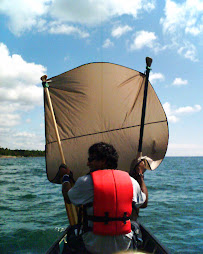
"The life of the Coureur des Bois was one of adventure, freedom, danger and travel. "
Pierre Esprit Radisson (1636-1710).
"These are the Peoples who learned to live without the bold accents of the national ego-trippers of other lands."
Marshall McLuhan (1911-1980)
Coureurs de bois were itinerant, unlicensed fur traders of New France known as "wood-runners" to the English on Hudson Bay and "bush-lopers" to the Anglo-Dutch of Albany (NY). Few French colonists had ventured west of the Ottawa River until the mid-1660s, when a sudden drop in the price of beaver, the arrival of some 3000 indentured servants and soldiers, and peace with the Iroquois made the change both necessary and feasible.
By 1680, despite repeated prohibitions from both the church and colonial authorities, some 500 coureurs de bois were in the Lake Superior country attempting to outdistance the Indian middlemen. As a result, fewer Indians brought furs to trade at Montréal and Trois-Rivières, inducing colonial merchants to hire some coureurs de bois in order to remain in business.
Licensing was eventually introduced by the authorities to control the seasonal exodus into the hinterland. Thus professional, "respectable" Voyageurs, usually associated with particular interior posts, came into being. Renegade traders persisted, becoming the primary bearers of the designation "coureur de bois" after the emergence of New Orleans as an alternative focus of the trade in the 18th century. The independent coureurs de bois played an important role in the European exploration of the continent and in establishing trading contacts with the Indians.
By 1680, despite repeated prohibitions from both the church and colonial authorities, some 500 coureurs de bois were in the Lake Superior country attempting to outdistance the Indian middlemen. As a result, fewer Indians brought furs to trade at Montréal and Trois-Rivières, inducing colonial merchants to hire some coureurs de bois in order to remain in business.
Licensing was eventually introduced by the authorities to control the seasonal exodus into the hinterland. Thus professional, "respectable" Voyageurs, usually associated with particular interior posts, came into being. Renegade traders persisted, becoming the primary bearers of the designation "coureur de bois" after the emergence of New Orleans as an alternative focus of the trade in the 18th century. The independent coureurs de bois played an important role in the European exploration of the continent and in establishing trading contacts with the Indians.






No comments:
Post a Comment